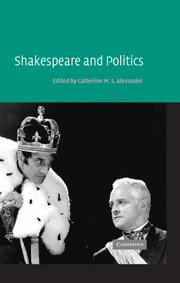Book contents
- Frontmatter
- Contents
- List of contributors
- Editor's note
- 1 Shakespeare and politics: an introduction
- 2 Shakespeare and politics
- 3 Henry VIII and the deconstruction of history
- 4 Livy, Machiavelli, and Shakespeare's Coriolanus
- 5 Richard II and the realities of power
- 6 Plutarch, insurrection, and dearth in Coriolanus
- 7 Some versions of coup d'état, rebellion, and revolution
- 8 Language, politics, and poverty in Shakespearian drama
- 9 ‘Demystifying the mystery of state’: King Lear and the world upside down
- 10 Venetian culture and the politics of Othello
- 11 The Bard and Ireland: Shakespeare's Protestantism as politics in disguise
- 12 Henry V as working-house of ideology
- 13 ‘Fashion it thus’: Julius Caesar and the politics of theatrical representation
- 14 Take me to your Leda
- 15 Macbeth on film: politics
- 16 William Shakespeare's Romeo + Juliet: everything's nice in America?
- Index
9 - ‘Demystifying the mystery of state’: King Lear and the world upside down
Published online by Cambridge University Press: 05 June 2012
- Frontmatter
- Contents
- List of contributors
- Editor's note
- 1 Shakespeare and politics: an introduction
- 2 Shakespeare and politics
- 3 Henry VIII and the deconstruction of history
- 4 Livy, Machiavelli, and Shakespeare's Coriolanus
- 5 Richard II and the realities of power
- 6 Plutarch, insurrection, and dearth in Coriolanus
- 7 Some versions of coup d'état, rebellion, and revolution
- 8 Language, politics, and poverty in Shakespearian drama
- 9 ‘Demystifying the mystery of state’: King Lear and the world upside down
- 10 Venetian culture and the politics of Othello
- 11 The Bard and Ireland: Shakespeare's Protestantism as politics in disguise
- 12 Henry V as working-house of ideology
- 13 ‘Fashion it thus’: Julius Caesar and the politics of theatrical representation
- 14 Take me to your Leda
- 15 Macbeth on film: politics
- 16 William Shakespeare's Romeo + Juliet: everything's nice in America?
- Index
Summary
King Lear is very much a political play – that is a play concerned with power and government in the state, with public and civil life, and not solely with private relationships and passions. Of course it is not only political; but it seems necessary to restate the point because recent productions so often try to make it a purely personal, familial, and psychological drama (much in the manner of A. C. Bradley, though a Bradley who has read Freud, Laing, and Foucault). However, even if this is intended to render the play acceptable to modern audiences (who are assumed to be very simple-minded), it is still a distortion, and makes much of the action unintelligible. As Peter Brook put it, the fact that the play is called King Lear does not mean that it is primarily the story of one individual – or, one may add, of one family. Shakespeare himself, by introducing the Gloucester parallel plot from quite another source, seems concerned to generalize the issues, to show that Lear's personal psychology or ‘character’ is not the only force at work.
There was a period, of course, when an exclusively timeless, ahistorical way of reading was more or less taken for granted. It was a great illumination for me, then, to read studies like John Danby's Shakespeare's Doctrine of Nature (1949), and the chapters by Kenneth Muir and Arnold Kettle in Shakespeare in a Changing World (1964), which attempted to read the play in the light of its contemporary historical and political significance, whatever reservations one may now have about some of their particular interpretations.
- Type
- Chapter
- Information
- Shakespeare and Politics , pp. 155 - 168Publisher: Cambridge University PressPrint publication year: 2004

